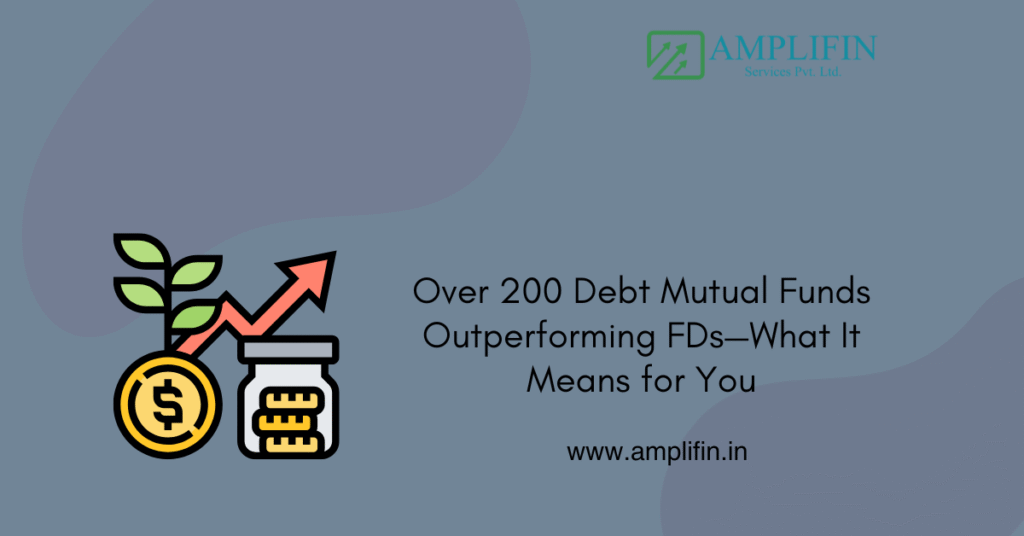Mutual Fund vs Fixed Deposit: Why Debt Mutual Funds Are Offering Better Returns Than Bank FDs
In today’s ever-changing financial landscape, investors are increasingly looking beyond traditional fixed deposits (FDs) to earn higher returns. Debt mutual funds have emerged as a strong alternative, often outperforming bank FDs while balancing risk and returns. This comprehensive guide will help you understand why debt mutual funds could be a better investment option, how they work, and what makes them stand out from fixed deposits.

Table of Contents
- Introduction to Mutual Funds and Debt Mutual Funds
- Understanding Fixed Deposits (FDs)
- FD vs Debt Mutual Fund: Key Differences
- Why Debt Mutual Funds Outperformed Bank FDs in the Last Two Years
- Interest Rates: Impact on FDs and Debt Mutual Funds
- Credit Risk in Debt Mutual Funds vs Guaranteed Return of FDs
- Types of Debt Mutual Funds to Consider
- Performance of Debt Mutual Funds in the Past Two Years
- Taxation: How Mutual Funds Are Taxed vs Fixed Deposits
- Which is a Better Investment Option?
1. Introduction to Mutual Funds and Debt Mutual Funds
A mutual fund pools money from multiple investors and invests in diversified asset classes such as equities, bonds, and other securities. One specific category within mutual funds is debt mutual funds, which primarily invest in debt instruments like government bonds, corporate debt, and money market instruments.
Debt mutual funds are ideal for investors looking for fixed income opportunities but with potentially better returns than traditional bank FDs. Over the years, mutual funds outperformed bank FDs due to professional management, active interest rate management, and diversified portfolios.
2. Understanding Fixed Deposits (FDs)
Fixed deposits or FDs are time-bound investment products offered by banks and NBFCs, promising a guaranteed return at a pre-agreed interest rate. They are considered among the safest investment options for conservative investors.
Bank FDs lock your money for a fixed tenure, and the returns remain unaffected by market fluctuations. While FDs offer safety, their interest earned on FDs may not always keep pace with inflation, especially when interest rates on fixed deposits are low.
3. FD vs Debt Mutual Fund: Key Differences
The debate of FD vs debt mutual fund boils down to several important factors:
- Returns: Historically, many debt funds outperformed bank FDs, especially when interest rates fall.
- Liquidity: Debt mutual funds offer higher liquidity compared to fixed deposits.
- Taxation: Gains from mutual fund investments can enjoy indexation benefits, making them more tax-efficient for longer holding periods.
- Risk: FDs offer guaranteed returns, while debt mutual funds carry credit risk and interest rate risks.
- Flexibility: Debt mutual funds allow partial withdrawals, systematic investment plans (SIPs), and systematic withdrawal plans (SWPs).
4. Why Debt Mutual Funds Outperformed Bank FDs in the Last Two Years
In the last two years, debt mutual funds outperformed bank FDs mainly due to falling interest rates and active fund management. As interest rates declined, bond prices rose, generating capital gains for debt mutual funds.
Additionally, top-performing debt funds managed their portfolios actively, taking advantage of duration strategies, credit spreads, and tactical asset allocations. This allowed many debt mutual funds to deliver better returns than FDs.
5. Interest Rates: Impact on FDs and Debt Mutual Funds
Interest rates play a crucial role in both investment vehicles:
- In fixed deposits, the interest rate is locked at the time of investment. Any change in market rates doesn’t impact your returns.
- In debt funds, falling interest rates can lead to capital appreciation as bond prices rise.
Over the past two years, falling interest rates on fixed deposits made many investors consider debt funds for their higher returns potential.
6. Credit Risk in Debt Mutual Funds vs Guaranteed Return of FDs
One of the most significant differences between debt mutual funds and fixed deposits is credit risk:
- Fixed deposits offer guaranteed return, backed by the financial strength of the bank or NBFC.
- Debt mutual funds invest in various debt instruments, which may carry different levels of credit risk depending on the issuer’s creditworthiness.
However, investors can opt for safer categories within debt mutual funds, such as gilt funds, which invest only in government securities and carry minimal credit risk.
7. Types of Debt Mutual Funds to Consider
There are different types of debt funds available to suit various investor needs:
- Gilt Fund: Invests in government securities; minimal credit risk.
- Liquid Fund: Suitable for very short-term investments; highly liquid.
- Short Duration Funds: Balanced exposure to short-term bonds; lower sensitivity to interest rate changes.
- Long Duration Debt Fund: Higher duration risk but better capital gains potential when interest rates fall.
- Dynamic Bond Funds: Actively managed across maturities depending on interest rate outlook.
- Corporate Debt Funds: Invests in high-rated corporate bonds.
Choosing the right fund depends on your risk appetite, investment horizon, and return expectations.
8. Performance of Debt Mutual Funds in the Past Two Years
The performance of all debt mutual funds has varied based on categories and market conditions. Many funds have outperformed traditional FDs due to better management of interest rate movements.
According to recent data, select performing debt funds have delivered returns that were 200 bps higher than bank fixed deposits. Funds from major AMCs like ICICI Prudential Mutual have consistently offered better returns than FDs for medium-term investors.
For example, 200 debt mutual funds were analyzed, and a significant portion showed mutual funds outperformed bank fds in terms of post-tax returns.
9. Taxation: How Mutual Funds Are Taxed vs Fixed Deposits
Tax efficiency is another key advantage of debt mutual funds over fixed deposits:
- Interest earned on FDs is fully taxable as per your income slab.
- Gains from debt mutual funds (long-term, if held for over 3 years before recent tax rule changes) enjoyed indexation benefits, reducing effective tax rates.
Although recent tax amendments have reduced some advantages, mutual funds are taxed more efficiently for certain holding periods compared to fixed deposits.
10. Which is a Better Investment Option?
Whether fixed deposits or mutual funds are better depends on multiple factors:
- If your priority is guaranteed return, then fixed deposits have long been the go-to option.
- If you seek better returns than bank fds and can tolerate some credit risk, debt mutual funds offer superior potential.
- For conservative investors, gilt fund or short-term funds may offer a balanced middle ground.
- For long-term investors, select duration debt funds or dynamic bond funds may yield attractive mutual fund returns.
Summary of Key Points
- Debt mutual funds offer better returns than FDs in many scenarios due to active management and market opportunities.
- Interest rate movements have a direct impact on debt fund performance, while FDs provide a guaranteed return.
- Credit risk is a key factor in debt mutual fund investments, but categories like gilt fund minimize this risk.
- Taxation favors mutual fund investments over fixed deposits for longer durations.
- In the past two years, many mutual funds outperformed bank FDs, with funds have outperformed the bank deposit rate.
- There are different types of debt funds to suit every investor’s profile, from liquid funds to corporate debt funds.
- For best results, align your risk appetite, investment horizon, and financial goals before choosing between bank FDs and debt mutual funds.
